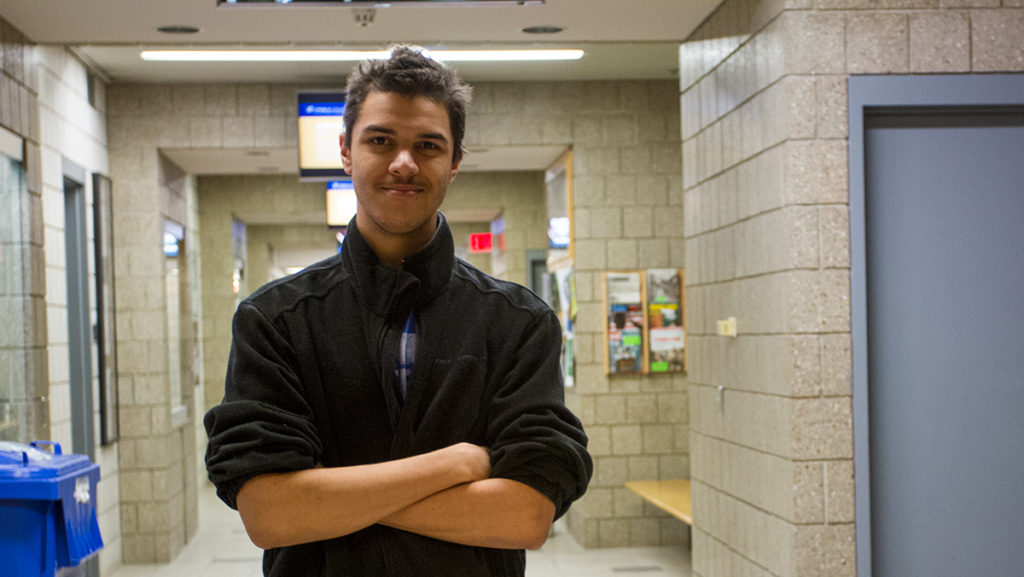Senior Byron Bixler, president and editor in chief of Filmic Magazine, was one of four Ithaca College students who created the film-oriented publication. Since its inception in Fall 2014, the publication has grown from 15 members to roughly 40 today, who submit reviews on a monthly — or sometimes more frequent — basis.
The editors of Filmic Magazine, previously known as Film Fervor Magazine, have planned four film screenings for the remainder of the semester in the Park Auditorium in the Roy H. Park School of Communications, beginning with “The Spirit of the Beehive” at 7 p.m. March 26. The Ithaca College chapter of the Delta Kappa Alpha National Professional Cinema Fraternity, or DKA — a community of students with a passion for film, is partnering with Filmic to promote and pay for the screenings.
Life & Culture Editor Kate Nalepinski spoke with Bixler to discuss the diversity of the upcoming film series, how the magazine has evolved and what he hopes the future of Filmic holds.
This interview has been edited for length and clarity.
Kate Nalepinski: What is Filmic, and what’s the objective of the magazine?
Byron Bixler: It started my sophomore year, two years ago, and it came from the idea that I was a cinema production student at the time and I saw how students in that major interacted, and there was a lot of vibrant film talk around campus, but there wasn’t a publication to facilitate that discussion. It was all out in the open, and I wanted to create an organization that would give voice to students to practice film criticism if they wanted to. … You just had to have a passion for film, you just wanted to talk about them.
KN: A lot has changed since you last spoke with The Ithacan. Besides the name switch, what has shifted about the magazine in general?
BB: The first issue we ever put out, I think we had 15 people or something. … Now it’s kind of hard to pinpoint exactly what membership is, but I’d say as far as engaged members, it’d be around 40. We don’t have a quota where everyone has to write every once in a while, though. … Outside of that, we started a podcast in the fall. It was another way to engage people. We got social media up; we got a Twitter recently.
KN: Tell me about the upcoming spring screening series. Is there a theme within the films?
BB: There isn’t exactly an overarching theme tying them all together. But each one has a certain theme it’s trying to express. The idea is to be as diverse as possible in terms of what we’re offering. …. So we’re pulling movies from all around the world — different time periods, different genres. ...The next one we’re showing is “The Spirit of the Beehive,” which is a Spanish film from the early ’70s. We’re partnering up with the Department of Languages for that, and that is more surrealist, more magical realism. … Following up on that, we go to 1969, with “Putney Swope,” which is a satire on race relations, specifically in the marketing industry.
KN: What was your goal in being more versatile in terms of the film selection?
BB: Well, one of the things was, because I’ve been through classes, like … Hollywood and American cinema, I know the staples, I know the kinds of things that get shown in classes. I wanted to pick things that would teach you just as much but you’d probably not encounter in a classroom setting, and they’d also engage and entertain. … The post-film discussions that we do are very open-ended. We just let people talk about whatever they want to talk about, or what struck them. It’s not a case of us targeting the audience and looking for an analysis on this point or this point. … It’s just to get people thinking about films they might not have otherwise seen.
KN: Why did you decide to partner up with DKA for the film screenings?
BB: A big part of it was money. … For our first screening series, [it] was hard to get the money together. When purchasing public performance rights, it can be as much as $250 per film, and when you’re doing five films, that’s a lot to raise. I remember, we came up short last time and I had to fill in the rest myself. … I really wanted to avoid that. In addition to money worries, [this connection to DKA] expands our audience. … Reaching out to DKA, which is popular, would get people in that way. We’ve already seen with our first screening back in February, our turnout was a bit better than on average.
KN: As a senior, where do you see the future of Filmic?
BB: Part of the podcast, I was trying to start an interview series with filmmakers on campus. I thought there are so many people working on thesis projects and [Advanced Cinema and Production] films. I know, when you’re involved in that process, you’re so passionate about what you’re doing but you might not have the outlet to tell everyone about that unless it’s showing them the film itself. So giving people the opportunity to talk about their film and promote it is something I’d like to see going forward.














